Resource Center
The Transit Workforce Center is pleased to host a curated collection of publications and other materials to assist stakeholders engaged in transit workforce development. The Resource Center includes case studies, training materials, research reports, and other materials of interest, including publications produced by federal government agencies, transit organizations, and independent research entities. Resources may be filtered by topic, resource type, and transit mode. This TWC blog post explains how to use the Resource Center.
We are continuing to update the Resource Center regularly. Please contact us via the Request Help menu option if you would like assistance using the Resource Center or are looking for resources on a particular topic. We also welcome suggestions of topics or specific resources to add.
Content in external resources linked from the Resource Center is solely the responsibility of the resource authors and does not necessarily reflect the perspectives of or endorsement by the Transit Workforce Center.
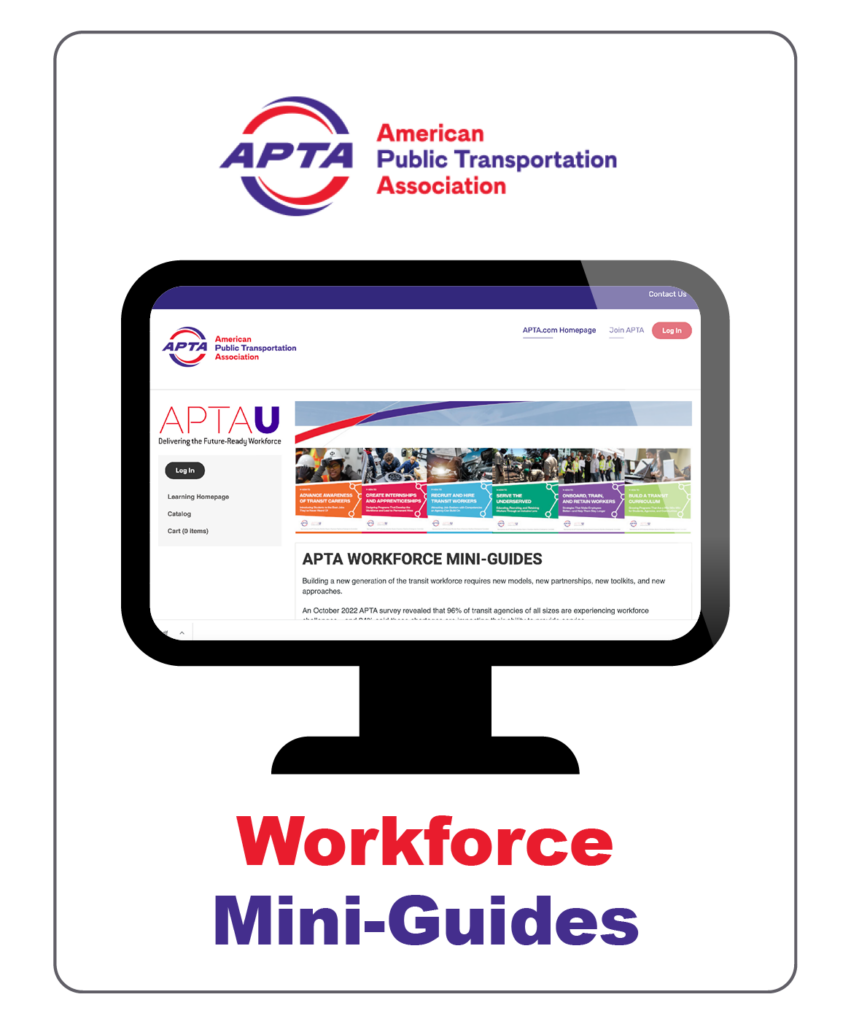
Workforce Mini-Guides
These six workforce development mini-guides are designed to help develop and implement successful strategies to address the critical workforce shortages seen across the public transportation industry. They cover these topics: advancing awareness of transit careers; creating internships and apprenticeships; recruiting and hiring transit workers; serving the underserved in the workforce; onboarding, training, and retaining workers; and building a transit curriculum.
American Public Transportation Association
April 2023
TOPICS: Apprenticeship, Career Pathways, Community Engagement, Hiring and Recruitment, Retention, Trainer and Mentor Development, Workforce Shortage
An October 2022 survey conducted by APTA revealed that 96 percent of transit agencies of all sizes are experiencing workforce challenges, and 84 percent said these shortages are impacting their ability to provide service. APTA developed these mini-guides building on their 2021 Transit Workforce Readiness Guide and combining industry insights and stories, case studies, lessons learned, and best practices.
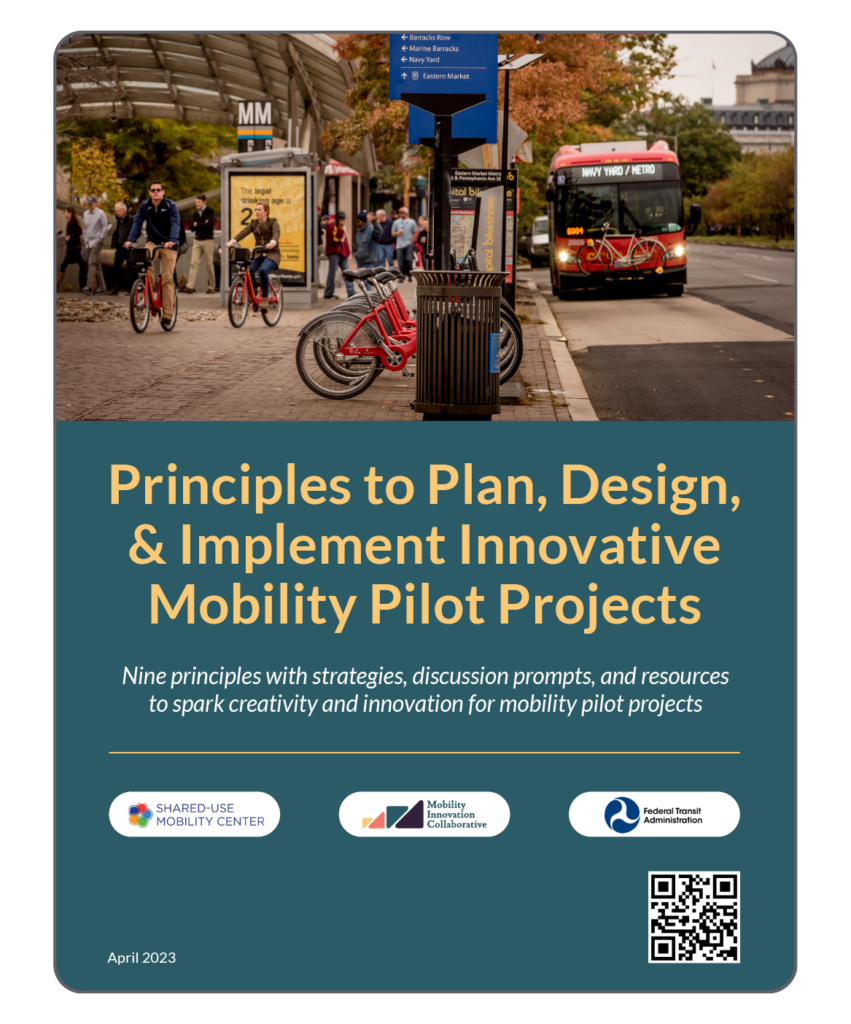
Guidebook for Mobility Innovation: Principles to Plan, Design, & Implement Innovative Mobility Projects
This guidebook is designed to help mobility innovators in the transportation sector while developing and implementing a pilot project. It provides a series of principles to better plan, design, and implement innovative mobility pilot projects.
Shared-Use Mobility Center
April 2023
TOPICS: Policy and Planning, Training
This guidebook is designed to help mobility innovators in the transportation sector while developing and implementing a pilot project. It provides a series of principles to better plan, design, and implement innovative mobility pilot projects. These principles have supporting information about strategies to execute this principle, examples of this principle in action, resources about this principle, and questions to prompt team discussions. The guidebook includes advice and support for training transit workers during a pilot project.
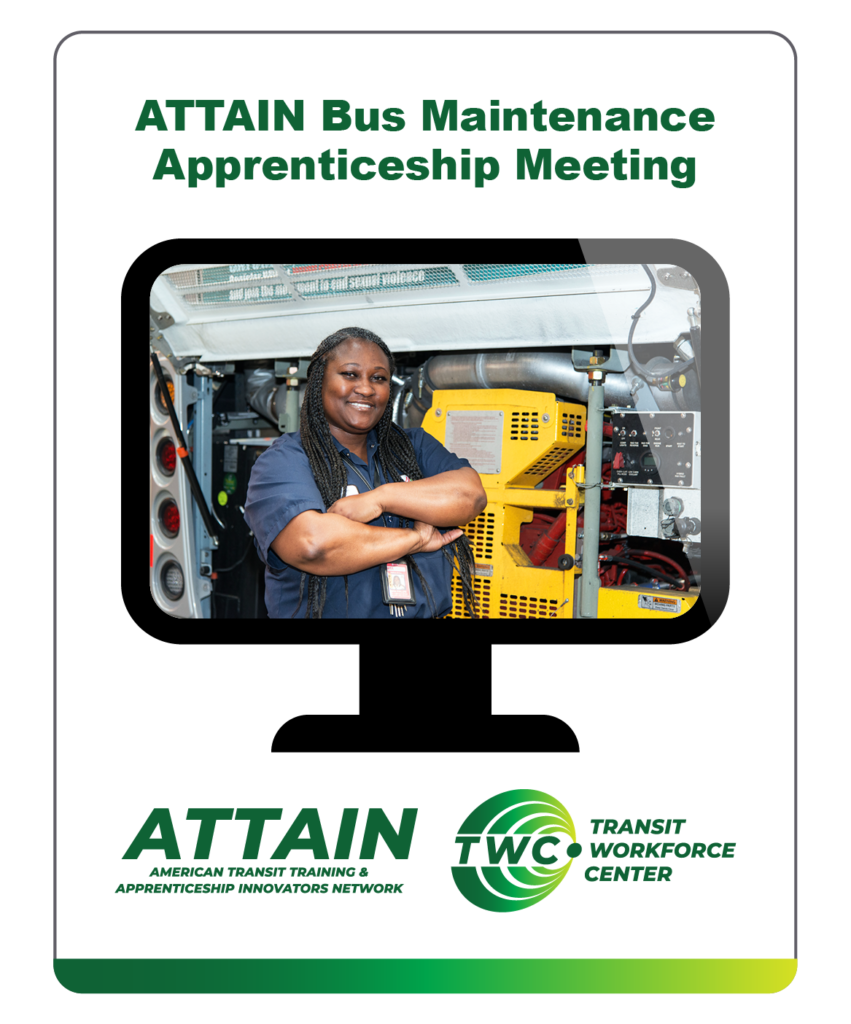
ATTAIN Bus Maintenance Apprenticeship Meeting
The American Transit Training and Apprenticeship Innovators Network (ATTAIN), run by the Transit Workforce Center (TWC), is a peer network created for transit agencies and labor unions to explore new apprenticeship programs or enhance existing programs for their frontline workforce. This recorded meeting of the ATTAIN Bus Maintenance Committee serves as a resource for transit industry stakeholders and includes presentations on apprenticeship and case studies of successful programs across the country.
Transit Workforce Center
March 2023
LEARN MORE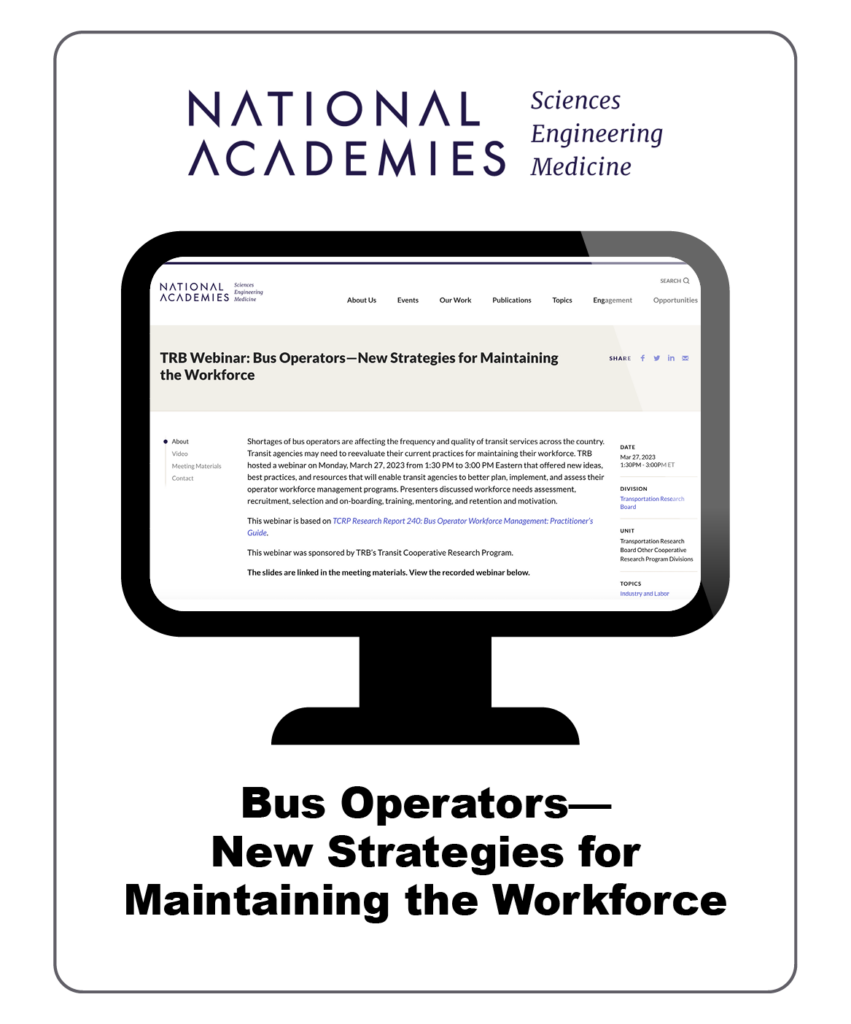
Bus Operators—New Strategies for Maintaining the Workforce
This webinar discusses the ideas, best practices, and resources that will enable transit agencies to better plan, implement, and assess their operator workforce management programs as described in the Bus Operator Workforce Management: Practitioner’s Guide. Presenters discussed workforce needs assessment, recruitment, selection and on-boarding, training, mentoring, and retention and motivation.
Transit Cooperative Research Program
March 2023
TOPICS: Apprenticeship, Hiring and Recruitment, Mentorship, Policy and Planning, Retention, Workforce Shortage
Webinar agenda and presenters
- Bus operator training and retention – Xinge Wang, International Transportation Learning Center
- Lessons from Florida – Trish Collins, Pinellas Suncoast Transit Authority
- Lessons from the Midwest – George F. Fields, Greater Cleveland Regional Transit Authority
- Question and answer session moderated by Robert Puentes, Eno Center for Transportation
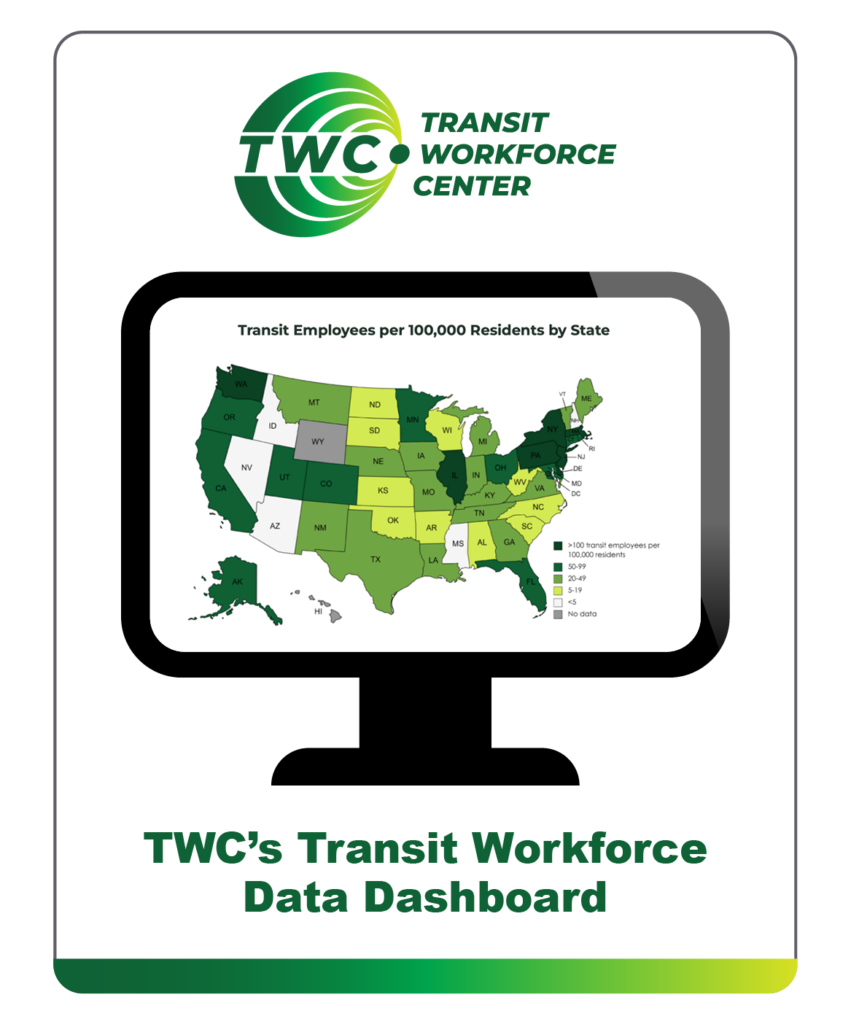
TWC’s Transit Workforce Data Dashboard
Launched in March, 2023, the Transit Workforce Data Dashboard presents quantitative, descriptive data about the composition of the transit workforce and trends in transit employment using a series of charts and graphics. This information is relevant for industry discussions in a range of contexts, including: strategic workforce planning in recruitment, retention, and other areas; examining and addressing opportunities and challenges related to workforce demographics; and identifying training and funding needs.
Transit Workforce Center
March 2023
TOPICS: Community Engagement, Hiring and Recruitment, Policy and Planning, Program Evaluation and ROI
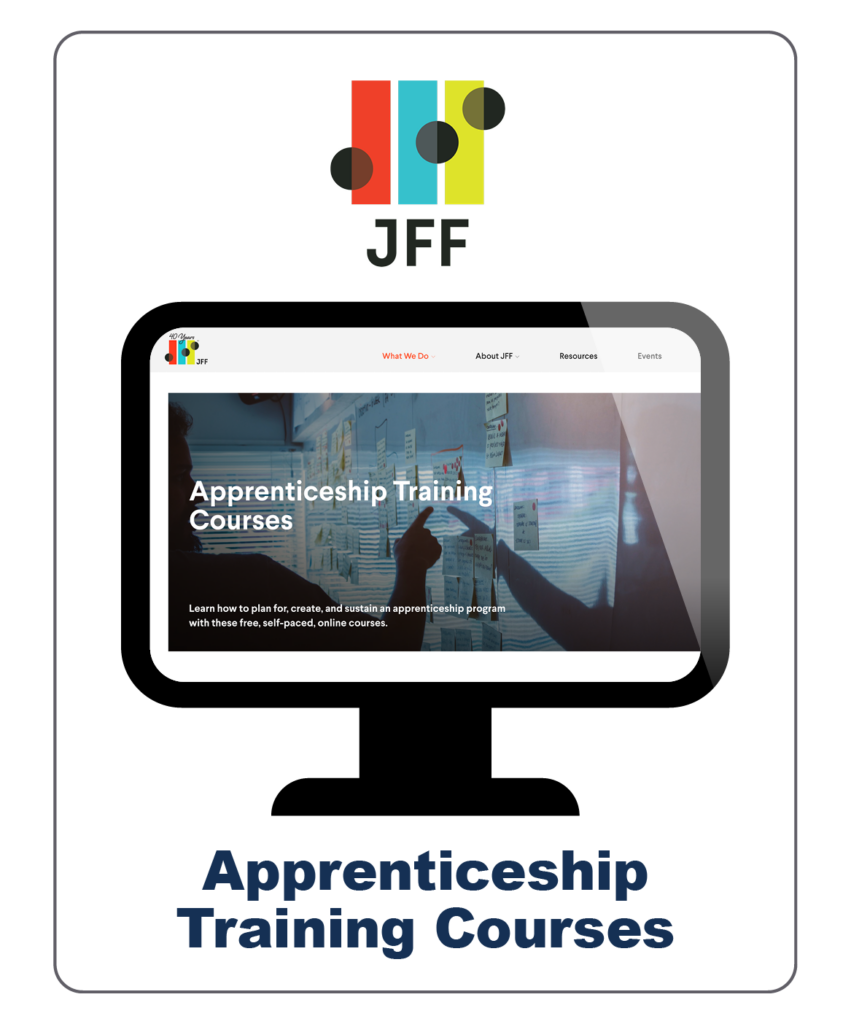
Apprenticeship Training Courses
This series of free online training courses will help transit providers and others plan for, create, and sustain registered apprenticeship programs. Several courses have already been released and others are forthcoming.
Jobs for the Future
March 2023
LEARN MORE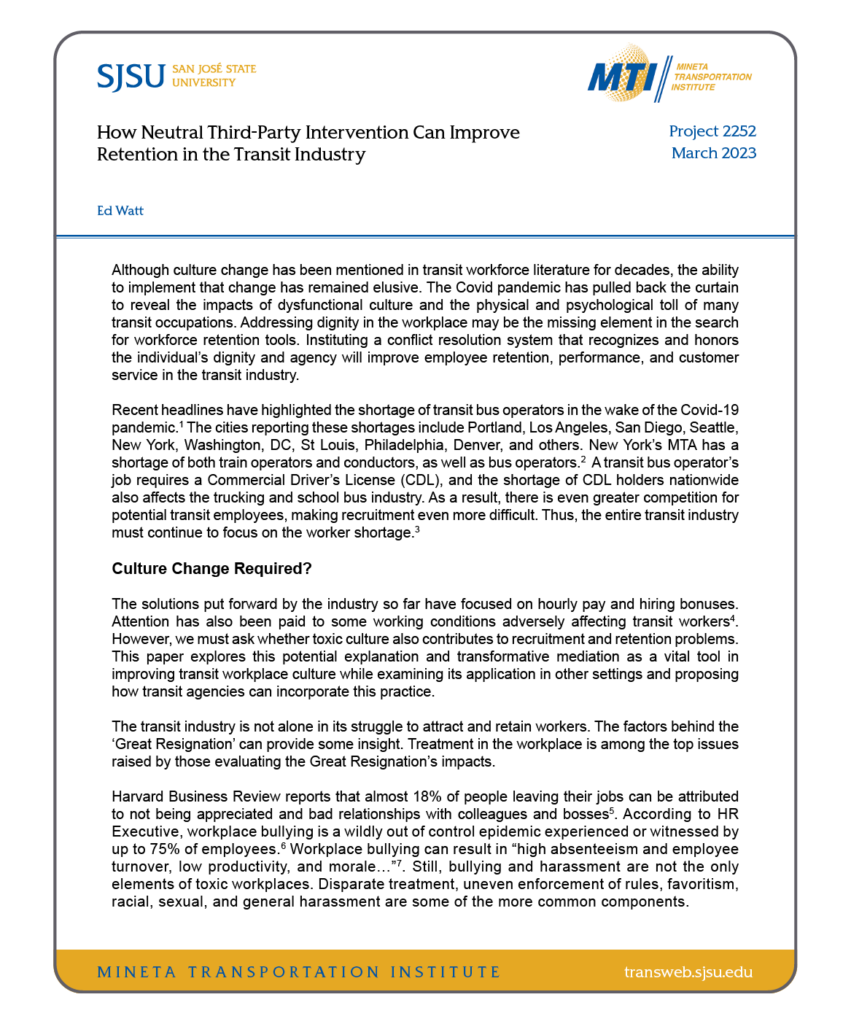
How Neutral Third-Party Intervention Can Improve Retention in the Transit Industry
This study proposes methods that follow transformative mediation in order to improve hiring and retention at transit agencies and other companies by providing an organizational culture that respects each person’s dignity, identity, and opinions.
Mineta Transportation Institute
March 2023
TOPICS: Community Engagement, Hiring and Recruitment, Policy and Planning, Retention, Workforce Shortage
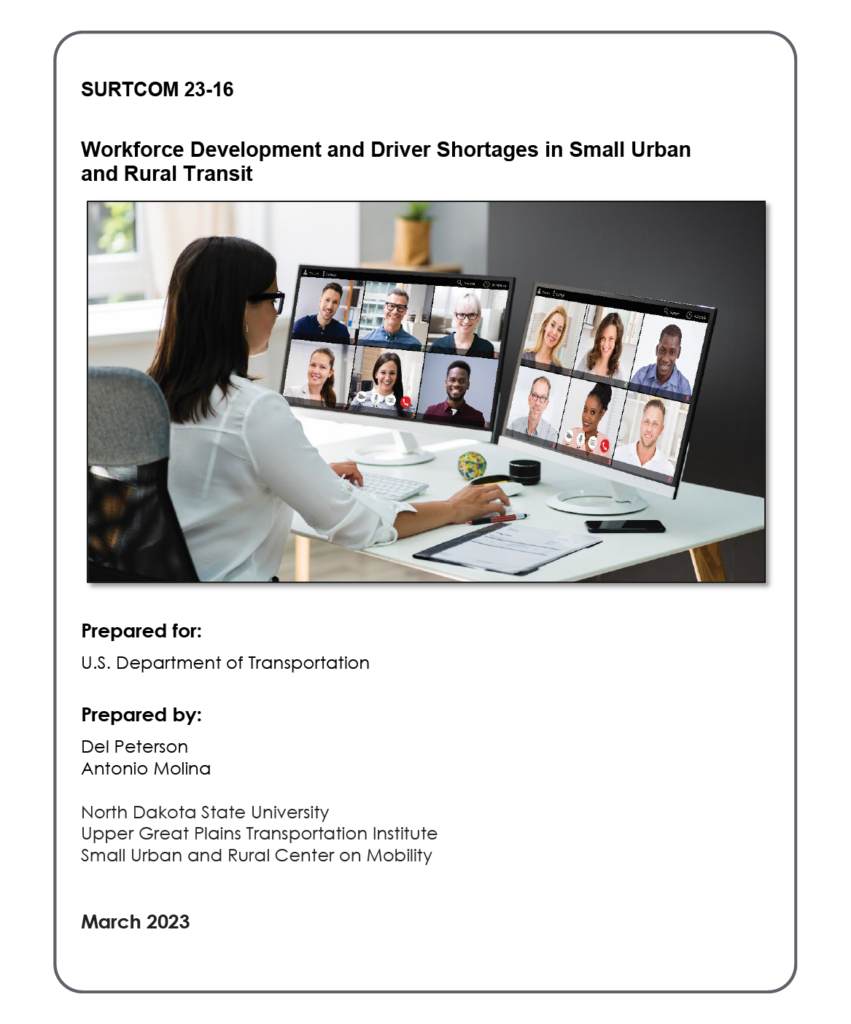
Workforce Development and Driver Shortages in Small Urban and Rural Transit
This report presents a national survey of small urban and rural transit managers to determine current workforce development practices. The survey results outline driver shortages and related issues, including an aging workforce, disruptions in service, and methods of alleviating the shortage.







